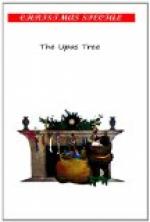did you withhold it? Why, after the first shock,
did you feel glad to face the prospect of bearing
it alone; glad I should be away? Ah, here we
find the very roots of the Upas tree! Was it not
because, during the whole of our married life, I have
been cheerfully, complacently selfish? I have
calmly accepted as the rule of the home, that I should
hear of no worries which you could keep from me, tread
upon no thorns which you could clear out of my path,
bear no burdens which your loving hands could lift
and carry out of sight. Your interests, your
pleasures, your friends, your pursuits, all have been
swept on one side, if they seemed in the smallest degree
likely to interfere with my work, my desires, my career.
You have lived for me—absolutely.
I have lived for myself. True, we have loved each
other tenderly; we have been immensely happy.
But, all the while, the shadow of the Upas tree was
there. My very love was selfish! It was sheer
joy to love you, because you are so sweetly, so altogether,
lovable. But when did I—because of
my love for you—do one single thing at any
cost to self? I was utterly, preposterously,
altogether, selfish! You knew this. You
knew I hated pain, or worry, or anything which put
my comfortable life out of gear. So you gladly
let me go, leaving you to bear it all alone.
You knew that, had you told me, I should have given
up my book and stayed with you; because my self-love
would have been more wounded by going than by staying.
But you also knew that during all those months you
would have had to listen while I bemoaned the circumstances,
and bewailed my plot. You knew the bloom would
be taken off the coming joy, so you preferred to let
me go. Oh, Helen, is not this true?”
She bent her head and kissed his hand. She was
weeping silently. She could not say it was not
true.
“It was the Upas tree indeed,” said Ronnie.
“Darling,” she whispered, “it was
my fault too—”
“Hush,” he said. “There are
faults too noble to be accounted faults. But—if
you think you were at all to blame—you must
atone, by truly and faithfully helping in my fight
to root up the Upas tree.”
“Ronnie,” she said, “a pair of baby
hands will help us both. We must learn to live
life at its highest, for the sake of our little son.”
Then, knowing he had endured as much heart-searching
as a man could bear and be the better for it, she
said, smiling:
“Ronnie, his funny little hands are so absurdly
like yours.”
“Like mine?” repeated Ronnie, as
one awaking slowly from a sad dream, to a blissful
reality. “Why are they like mine?”
“Because he is a tiny miniature of you, you
dear, silly old boy! You do not seem to understand
that you are actually a father, Ronnie, with a little
son of your own!”
She looked up into his worn face, and saw the young
glad joy of life creep slowly back into it.
“And his mouth, darling—his little
mouth is just like yours; only, as I told you in the
letter, when I kiss it—it does not kiss
back, Ronnie.”




